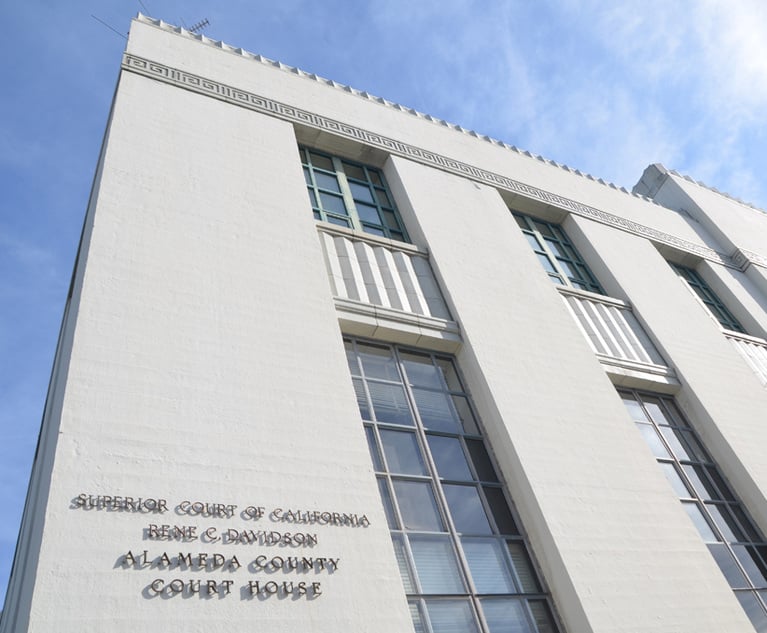San Francisco and UC Hastings to Talk Settlement in Lawsuit Over Tenderloin Conditions
U.S. District Judge Jon Tigar on Thursday said that he would grant the parties' request to appoint U.S. Magistrate Judge Jacqueline Scott Corley to oversee settlement talks in the lawsuit seeking to force the city to address homeless encampments and drug dealing in the neighborhood that's home to the University of California, Hastings College of the Law.
May 14, 2020 at 05:38 PM
4 minute read
 Homeless camp on Eddy and Taylor in San Francisco's Tenderloin on April 3, 2020. (Photo: Jason Doiy/ALM)
Homeless camp on Eddy and Taylor in San Francisco's Tenderloin on April 3, 2020. (Photo: Jason Doiy/ALM)
Lawyers for the city and county of San Francisco are hoping to reach a settlement with a coalition of residents and businesses in the Tenderloin led by the University of California, Hastings College of the Law who sued the city for allowing homeless encampments and drug dealing to overwhelm the neighborhood's sidewalks.
U.S. District Judge Jon Tigar of the Northern District of California said during an initial case management conference in the case Thursday that he was going to grant the parties' request to appoint U.S. Magistrate Judge Jacqueline Scott Corley to oversee settlement talks.
"She's willing to do this and she's quite enthusiastic about it," said Tigar, in a videoconference hearing Thursday afternoon. "I see that as a real piece of good news," added Tigar, who said his own schedule, which involves overseeing a case challenging prison conditions in California during the COVID-19 pandemic, has become hectic.
Tigar said that although he normally doesn't speak with judges he refers matters out to for settlement, he planned to be in contact with Corley "when the mood strikes me, because I'd sort of like to know what's going on." Tigar, however, also told Deputy City Attorney Ryan Stevens, representing the city, that the parties could ask to tell some things to Corley in confidence without worrying that she would share them with the opposing side or him.
The UC Hastings-led coalitions sued the city and county May 4 claiming that San Francisco officials had allowed the Tenderloin to become "a containment zone" for drug and homelessness issues, making the neighborhood "insufferable" and unsafe during the current public health crisis.
"This is a matter of fundamental fairness; what is a citywide problem should not be allowed to weigh disproportionately on a low-income working-class neighborhood," wrote the coalition's lawyers at Walkup, Melodia, Kelly & Schoenberger in San Francisco and Greenberg Gross in Los Angeles. "San Francisco should be prohibited from abandoning a single neighborhood, in an apparent effort to spare other neighborhoods the burdens that confront the city at-large," they wrote.
 U.S. District Judge Jon Tigar of the Northern District of California. (Photo: Jason Doiy/ALM)
U.S. District Judge Jon Tigar of the Northern District of California. (Photo: Jason Doiy/ALM)During Thursday's hearing, Walkup Melodia's Michael Kelly said that he was grateful for Tigar's "almost immediate response" of asking the city's lawyers to make an appearance and get the case moving. Kelly noted that Thursday's case management conference was pulled together on "a record timeline." Kelly asked that Tigar hold weekly meetings initially to keep tabs on the parties' progress.
Tigar, for his part, asked the city and the plaintiffs to file weekly case management statements updating him. He also told the parties to let him know if there were "public health- or urban planning-type" articles they wanted him to read presenting possible resolutions.
"I would like to be sort of an information monster about this case," Tigar said.
Tigar also said that he would like to drive around the Tenderloin to check out conditions himself. Tigar said that he wouldn't be taking pictures or entering anything into the record that would turn that case "into a dog and pony show."
"Thanks for bringing me this interesting case," Tigar said. "I hope you're able to work things out. If not, don't worry," he told the lawyers. "That's how we all make a living."
Read more:
This content has been archived. It is available through our partners, LexisNexis® and Bloomberg Law.
To view this content, please continue to their sites.
Not a Lexis Subscriber?
Subscribe Now
Not a Bloomberg Law Subscriber?
Subscribe Now
NOT FOR REPRINT
© 2025 ALM Global, LLC, All Rights Reserved. Request academic re-use from www.copyright.com. All other uses, submit a request to [email protected]. For more information visit Asset & Logo Licensing.
You Might Like
View All


Federal Judge Pauses Trump Funding Freeze as Democratic AGs Plan Suit
4 minute read
Law Firms Mentioned
Trending Stories
- 1Trump's DOJ Files Lawsuit Seeking to Block $14B Tech Merger
- 2'No Retributive Actions,' Kash Patel Pledges if Confirmed to FBI
- 3Justice Department Sues to Block $14 Billion Juniper Buyout by Hewlett Packard Enterprise
- 4A Texas Lawyer Just Rose to the Trump Administration
- 5Hogan Lovells Hires White & Case Corporate and Finance Team in Italy
Who Got The Work
J. Brugh Lower of Gibbons has entered an appearance for industrial equipment supplier Devco Corporation in a pending trademark infringement lawsuit. The suit, accusing the defendant of selling knock-off Graco products, was filed Dec. 18 in New Jersey District Court by Rivkin Radler on behalf of Graco Inc. and Graco Minnesota. The case, assigned to U.S. District Judge Zahid N. Quraishi, is 3:24-cv-11294, Graco Inc. et al v. Devco Corporation.
Who Got The Work
Rebecca Maller-Stein and Kent A. Yalowitz of Arnold & Porter Kaye Scholer have entered their appearances for Hanaco Venture Capital and its executives, Lior Prosor and David Frankel, in a pending securities lawsuit. The action, filed on Dec. 24 in New York Southern District Court by Zell, Aron & Co. on behalf of Goldeneye Advisors, accuses the defendants of negligently and fraudulently managing the plaintiff's $1 million investment. The case, assigned to U.S. District Judge Vernon S. Broderick, is 1:24-cv-09918, Goldeneye Advisors, LLC v. Hanaco Venture Capital, Ltd. et al.
Who Got The Work
Attorneys from A&O Shearman has stepped in as defense counsel for Toronto-Dominion Bank and other defendants in a pending securities class action. The suit, filed Dec. 11 in New York Southern District Court by Bleichmar Fonti & Auld, accuses the defendants of concealing the bank's 'pervasive' deficiencies in regards to its compliance with the Bank Secrecy Act and the quality of its anti-money laundering controls. The case, assigned to U.S. District Judge Arun Subramanian, is 1:24-cv-09445, Gonzalez v. The Toronto-Dominion Bank et al.
Who Got The Work
Crown Castle International, a Pennsylvania company providing shared communications infrastructure, has turned to Luke D. Wolf of Gordon Rees Scully Mansukhani to fend off a pending breach-of-contract lawsuit. The court action, filed Nov. 25 in Michigan Eastern District Court by Hooper Hathaway PC on behalf of The Town Residences LLC, accuses Crown Castle of failing to transfer approximately $30,000 in utility payments from T-Mobile in breach of a roof-top lease and assignment agreement. The case, assigned to U.S. District Judge Susan K. Declercq, is 2:24-cv-13131, The Town Residences LLC v. T-Mobile US, Inc. et al.
Who Got The Work
Wilfred P. Coronato and Daniel M. Schwartz of McCarter & English have stepped in as defense counsel to Electrolux Home Products Inc. in a pending product liability lawsuit. The court action, filed Nov. 26 in New York Eastern District Court by Poulos Lopiccolo PC and Nagel Rice LLP on behalf of David Stern, alleges that the defendant's refrigerators’ drawers and shelving repeatedly break and fall apart within months after purchase. The case, assigned to U.S. District Judge Joan M. Azrack, is 2:24-cv-08204, Stern v. Electrolux Home Products, Inc.
Featured Firms
Law Offices of Gary Martin Hays & Associates, P.C.
(470) 294-1674
Law Offices of Mark E. Salomone
(857) 444-6468
Smith & Hassler
(713) 739-1250






